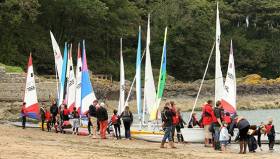Displaying items by tag: Regatta Club
There was a time when the local sailing club was a social centre for children, where they got their first ‘taste’ of sailing as a ‘fun’ and enjoyable occasion without the stress of competition and performance separating them from each other, based on their “sporting prowess.”
In the past few weeks I have learned from readers and listeners who have contacted me that there is more than one aspect of exclusivity about sailing and my opening description this week is compiled from what I have been told since I first expressed concern that the public perception of elitism in sailing may be excluding a wider coterie of people from participation in the sport.
The Irish Sailing Association has responded with the launch of the ‘Try Sailing Programme’ and a number of clubs have introduced Crew Point’ for newcomers to be introduced to the sport, which are positive initiatives, but ‘sailor/parents’ have referred me to their concerns that representative “squads” and “teams” lauded by clubs can deter youngsters who do not reach the perceived sporting parameters from continuing in the sport..
There is a dichotomy between the desire of clubs to be well represented nationally, which builds their reputations and similarly, for Ireland to do the same at international level, which necessitates identifying and developing high performers. Sailing is not the only sport needing the sustenance of success, but what about maintaining the interest of those who do not aspire to or succeed at the higher levels? Clubs are not founded on the success of “squads,” or “teams” or individual “stars” but on strong committed ‘ordinary’ members, the foundation for the future.
The Vice-Commodore of Royal North of Ireland Yacht Club, based at Holywood, Co.Down, is Michael Meharg, who has been telling me about the development of the concept of the ‘Regatta Club’ on Belfast Lough, mixing fun, the sociability of sailing and a gentle introduction to racing for young sailors, while at the same time increasing club membership, participation and introducing newcomers to the sport:
“You are probably aware of the RYA's "Push the Boat Out" initiative, encouraging "come and try it" days at the various yacht clubs? My club, RNIYC, has been running these days for the last five years with good results. We are holding our next one on May 22.”
He went on to tell me of a bigger concept, currently being launched, called ‘Regatta Club’ with a focus on young sailors. Michael is an RYA Senior Instructor with 30 years’ experience of training children, is easy to listen to and explains the concept well on this week’s THIS ISLAND NATION PODCAST, which you can hear below.
“As you rightly point out, a lot of organisations are racing-focussed and in my experience, many of the youngsters coming out of their first courses have neither the experience nor confidence to go straight into racing/squad training and prefer to sail for the fun and sociable side of things. If these opportunities are not there, we lose them! At the same time, Regatta attendance in Belfast Lough has been declining for some time now.”
Regatta Club’ aims to encourage youngsters from 8-to-18 years into "sociable sailing” and, perhaps, return to those days when children loved to go down to ‘the club’ to go sailing and the sport captured their lifetime interest as a result. Saturday, June 4, off Grey Point in Helen’s Bay, is the inaugural event and there is an open invitation to Afloat readers.
- Listen to the podcast below.





























































